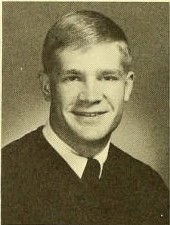Class of: 1968
Email: [email protected]
I was very active in ROTC at Stetson (Pershing Rifles, Scabbard and Blade, Brigade Commander, etc.), but never served in Vietnam. I certainly thought I would. As an ROTC scholarship student, I had a four-year Regular Army commitment. When my class did our six-week summer training (1967) at Ft. Bragg, all of us were told point blank that we would all end up in Vietnam! We held an exercise against members of the 82nd Airborne, a seasoned group that had already been to Vietnam. I was “killed” three times that one day. One of our Stetson cadets technically went AWOL upon seeing a firepower demonstration! He was quickly found and quietly ‘reintegrated’.
When my senior year started, the ROTC Professor of Military Science informed me that, because my grades were good, I might qualify for a deferment to pursue a graduate degree. The chances were greater, he said, because the war was so ‘psychological’ and I was a psychology major. Indeed, the deferment was granted when I was accepted to pursue a Ph.D. While working on my doctorate in biopsychology at the University of Georgia the war was never far from my mind. My classmates included a career Army officer who was also sent to get his doctorate in experimental psychology, and a decorated senior Army officer who had become disillusioned with the war, had resigned his commission, and had become a vocal critic of the war effort. By the time I was finishing my degree, I had been promoted to 1st Lt (with not a single day on active duty), and had been told that my four-year commitment was being reduced to two years.
So, in the summer of 1972 I went to Ft. Ben Harrison (Indiana) for three months of officer basic training in the Adjutant General Corps (personnel). Because of my seniority over the fresh-out-of-college 2nd Lts. I was put in charge of our class. That was somewhat comical since I had been in a strictly civilian capacity for four years and could no longer even recognize rank insignia! As my assignment there was ending, and with the war winding down, the Army suddenly gave me a choice: serve your two years or get out! I tried to stay in by requesting a transfer to the Medical Service Corps, a branch much more relevant to my degree in biopsychology. The Army concluded that was not feasible so I transitioned into the Ready Reserves. (I never was able to find an appropriate reserve unit, but stayed in the inactive reserves at the rank of Captain until my time was maxed out.)
Unexpectedly unemployed, I ended up being hired by Augusta College (a part of the University System of Georgia) for a one-year stint to teach psychology at Ft. Gordon to NCO’s coming back from Vietnam. My classroom was an old barracks building that I soon learned had once housed men in my father’s tank battalion as they held war games prior to fighting Rommel in North Africa. My father went through ROTC in college and fought in WW II. He stayed active in the reserves and retired as a full colonel. I wasn’t a military brat, but I was pretty gung ho. The Army had paid for a big chunk of my education at Stetson. I learned so much from my time in ROTC, especially about leadership and commitment. Many of my peers were struggling over Vietnam for political, moral or ideological reasons. Those were important for me, too; but mostly I was conflicted because somehow I hadn’t fulfilled an implied obligation. I should have served in Vietnam. What made me so special? Not a single thing. I’ve harbored a convoluted mix of emotions ever since. Still do. I thought I’d never be able to go to the Vietnam Memorial. Eventually I visited a traveling version, and it was more than I could bear. I’ve now been able to spend time at the memorial in Washington on several occasions, each no less emotional than the previous. What we as a generation experienced with Vietnam undoubtedly affects the very core of America today. The concept of PTSD is no longer rejected out of hand. And we’re trying to give today’s veterans a better welcome home than those who returned from Vietnam. Maybe that’s out of a collective sense of guilt. But what difference does that make if it is the right thing to do?
My wife and I have worked in Augusta, GA while sleeping on the other side of the Savannah River in North Augusta, SC for the last several decades. After the year I told you about on soft money teaching at Ft. Gordon I moved into a tenure track position at what was then Augusta College. It is now Augusta State University, and is about to merge with the state’s medical school (Georgia Health Sciences University). I officially retired in July of 2010, but have continued to do some teaching and research at both institutions. I’m active as a mental health advocate, as well. I haven’t gotten back to Stetson very often, but was invited to do a guest presentation a few years back when I was serving as the president of the Southeastern Psychological Association. In fact, we’re about to head to Orlando for a few days and I’m sure I’ll at least drive through DeLand for old times sake. A couple of weeks ago I was in New Orleans for a conference and stopped by the National WW II Museum. It is a must see, and I’ll have to go back when I have more time. Lots of oral histories that I’d like to see/hear.
